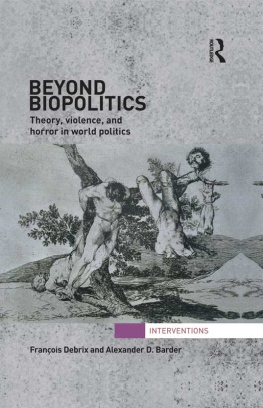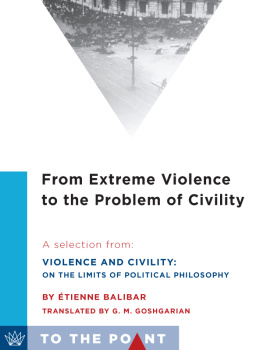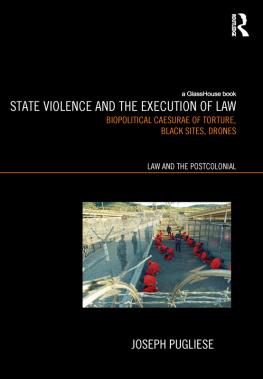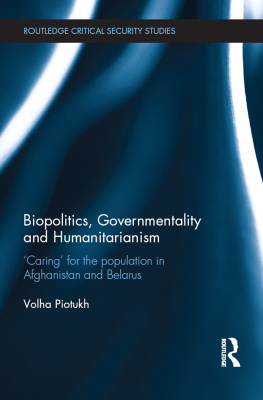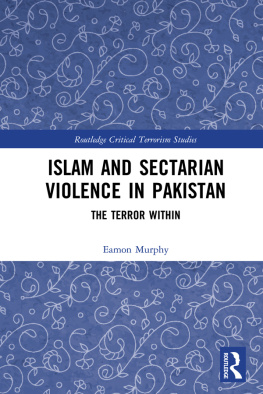Beyond Biopolitics
Confronting the violence that pulverizes being Debrix and Barder invite us to expand our attachment to biopolitics and to take in the horror of contemporary violence, understanding that what is at stake is not the end of human life itself but the end of the human condition. Mobilizing a host of philosophers from Butler, Gambian and Member to Esposito and Coverer, they urge us to reckon with power as something that kills. This is a valuable, provocative and passionate intervention.
Sherene H. Razack, University of Toronto, Canada.
Why must we move beyond biopolitics? Debrix and Birder assail the foundations of biopolitical critique, showing how such approaches remain wedded to a liberal model of life-affirmation which blinds them to central aspects of death and destruction. Pushing their analysis beyond the limits of human life, Debrix and Barder show how agonal sovereignty mobilizes fear, flesh, and failure to erase those modes of being whose singularity resists the logics of contemporary international politics. Drawing on such diverse sites of terror as Mexican nacre killings, the Guantanamo concentration camp, and the transmission of transnational disease, Beyond Biopolitics identifies the complex economies of horror underpinning international relations, while also providing an accessible and critical reading of Arndt, Schmitt, Mbembe, Agamben, and Foucault.
Kennan Ferguson, University of WisconsinMilwaukee, USA.
Beyond Biopolitics exposes the conceptual limits of critical biopolitical approaches to violence, war, and terror in the post-9/11War on Terror era.
This volume shows that such popular international political theories rely upon frames of representation that leave out of focus a series of extreme forms of gruesome violence, which have no concern for the preservation of life, a crucial biopolitical theme. Debrix and Barder mobilize different conceptshorror, agonal sovereignty, the pulverization of the flesh, or the notion of an inhumanity-to-cometo shed light on past and present ghastly scenes and events of violence that seek to undo the very idea of humanity. To highlight the capacity of horror to be in excess of both violence and the meaning of humanity, Beyond Biopolitics provides a series of engagements with issues much debated in contemporary critical theory circles, in particular war and terror, the production of fear, states and spaces of exception, and alterity as enmity.
This work will be of great interest to scholars of critical international relations theory, critical security studies, and international relations.
Franois Debrix is ASPECT Director and Professor of Political Science at Virginia Tech., USA.
Alexander D. Barder is a Doctoral Candidate in the Department of Political Science at Johns Hopkins University, USA.
Interventions
Edited by: Jenny Edkins
Aberystwyth University
and Nick Vaughan-Williams,
University of Warwick
As Michel Foucault has famously stated: knowledge is not made for understanding; it is made for cutting. In this spirit The EdkinsVaughan-Williams Interventions series solicits cutting edge, critical works that challenge mainstream understandings in international relations. It is the best place to contribute post disciplinary works that think rather than merely recognize and affirm the world recycled in IRs traditional geopolitical imaginary.
Michael J. Shapiro, University of Hawaii at Mnoa, US
The series aims to advance understanding of the key areas in which scholars working within broad critical post-structural and post-colonial traditions have chosen to make their interventions, and to present innovative analyses of important topics.
Titles in the series engage with critical thinkers in philosophy, sociology, politics and other disciplines and provide situated historical, empirical and textual studies in international politics.
Critical Theorists and International Relations
Edited by Jenny Edkins and Nick Vaughan-Williams
Ethics as Foreign Policy
Britain, the EU and the other
Dan Bulley
Universality, Ethics and International Relations
A grammatical reading
Vronique Pin-Fat
The Time of the City
Politics, philosophy, and genre
Michael J. Shapiro
Governing Sustainable Development
Partnership, protest and power at the world summit
Carl Death
Insuring Security
Biopolitics, security and risk
Luis Lobo-Guerrero
Foucault and International Relations
New critical engagements
Edited by Nicholas J. Kiersey and Doug Stokes
International Relations and Non-Western Thought
Imperialism, colonialism and investigations of global modernity
Edited by Robbie Shilliam
Autobiographical International Relations
I, IR
Edited by Naeem Inayatullah
War and Rape
Law, memory and justice
Nicola Henry
Madness in International Relations
Psychology, security and the global governance of mental health
Alison Howell
Spatiality, Sovereignty and Carl Schmitt
Geographies of the Nomos
Edited by Stephen Legg
Politics of Urbanism
Seeing like a city
Warren Magnusson
Beyond Biopolitics
Theory, violence and horror in world politics
Franois Debrix and Alexander D. Barder
The Politics of Speed
Capitalism, the state and war in an accelerating world
Simon Glezos
Beyond Biopolitics
Theory, violence, and horror
in world politics
Franois Debrix and Alexander D. Barder

First published 2012
by Routledge
2 Park Square, Milton Park, Abingdon, Oxon, OX14 4RN
Simultaneously published in the USA and Canada
by Routledge
711 Third Avenue, New York, NY 10017
Routledge is an imprint of the Taylor & Francis Group, an informa business
2012 Franois Debrix and Alexander D. Barder
The right of Franois Debrix and Alexander D. Barder to be identified as authors of this work has been asserted by them in accordance with the Copyright, Designs and Patent Act 1988.
All rights reserved. No part of this book may be reprinted or reproduced or utilised in any form or by any electronic, mechanical, or other means, now known or hereafter invented, including photocopying and recording, or in any information storage or retrieval system, without permission in writing from the publishers.
Trademark notice: Product or corporate names may be trademarks or registered trademarks, and are used only for identification and explanation without intent to infringe.
British Library Cataloguing in Publication Data
A catalogue record for this book is available from the British Library
Library of Congress Cataloging in Publication Data
Debrix, Franois.
Beyond biopolitics: theory, violence, and horror in world politics / Franois
Debrix and Alexander D. Barder.
p. cm. (Interventions)
Includes bibliographical references and index.
1. Biopolitics. 2. Terrorism. 3. War on Terrorism, 20019. 4. Political violence. I. Barder, Alexander D. II. Title.
JA80.D43 2011
ISBN: 978-0-415-78059-9 (hbk)
ISBN: 978-0-203-80481-0 (ebk)
Acknowledgements
Since we devised this project some three years or so ago now, we have had the opportunity to present our thoughts and ideas to many friends and colleagues who have been most gracious in listening to us, spending time with us exchanging views about some of the books key themes, and often diligently and critically reading many of the chapters. We owe an enormous debt of gratitude to Clair Apodaca, Mat Coleman, Simon Dalby, Clem Fatovic, Kennan Ferguson, Harry Gould, Jairus Victor Grove, Nick Kiersey, Mark Lacy, Tim Luke, Scott Nelson, Nick Onuf, Brent Steele, Cindy Weber, and Jason Weidner for providing us encouragements and crucial insights along the way. At various professional conferences and invited lectures and presentations, we gathered important critical feedback from Rick Ashley, Jane Bennett, Didier Bigo, Peter Breiner, David Chandler, Jenny Edkins, Kathy Ferguson, David Grondin, John Heathershaw, Bettina Koch, Stephen Legg, Claudio Minca, Francis Moreault, Louiza Odysseos, David Pan, Mustapha Pasha, Rory Rowan, Marcy Schnitzer, Giorgio Shani, Michael Shapiro, Nevi Soguk, Jean-Franois Thibault, Gerard Toal, Hiroyuki Tosa, Andrew Valls, Nick Vaughan-Williams, Luc Vigneault, Rob Walker, Edward Weisband, and Laura Zanotti. They kept us intellectually honest, and they motivated us to push our critical arguments further. A special thanks goes to all the participants of the international relations working group at Johns Hopkins University, including Kellan Anfinson, Willy Blomme, Derek Denman, Stefanie Fishel, Nicole Hughes, Hitomi Koyama, Renee Marlin Bennett, Casey McNeil, and Ben Meiches. They were always eager to hear our thoughts and to engage our perspectives every time we were lucky to present our work to them. Three anonymous reviewers for Routledge offered us useful comments and suggestions that strengthened the manuscript. We are grateful for their reviews. We would also like to thank Jenny Edkins and Nick Vaughan-Williams, the editors of the Interventions series, who supported the project from the very beginning and were always available for sage advice and necessary analytical input. Finally, we wish to recognize Craig Fowlie and Nicola Parkin for their unwavering support, their patience, and their strong belief in the importance of critical thinking.
Next page
